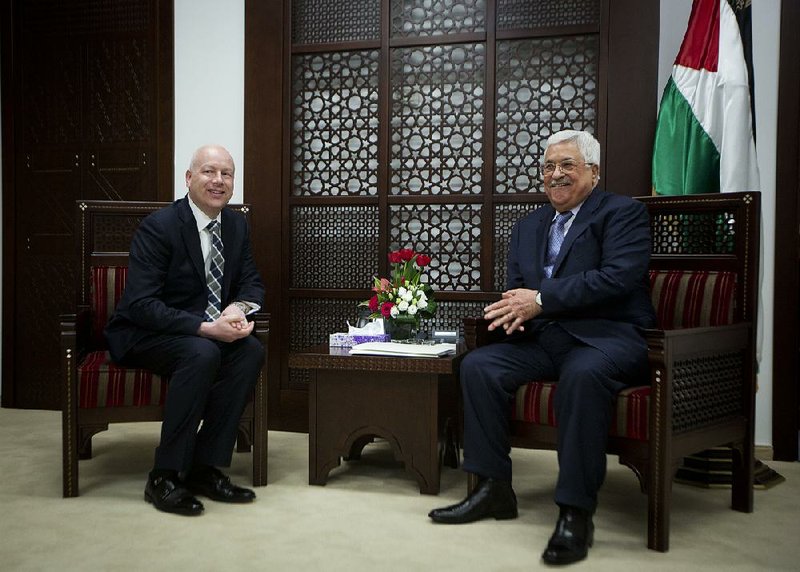RAMALLAH, West Bank -- A U.S. envoy wrapped up his first visit to the Middle East on Tuesday with commitments from Israel and the Palestinians to advance "a genuine and lasting peace."
A joint U.S.-Palestinian statement gave few details on how President Donald Trump plans to break decades of deadlock and hostilities. It said Palestinian President Mahmoud Abbas would discuss possibilities for peace with Trump on an upcoming visit to Washington.
Trump campaigned on promises that he would depart from decades of American policy in the region, and he signaled a much closer relationship with Israel than former President Barack Obama.
His platform made no mention of Palestinian statehood, a key goal of the U.S. and international community for two decades. He promised to move the U.S. Embassy from Tel Aviv to disputed Jerusalem, a move favored by Israel and bitterly opposed by the Palestinians, and signaled much greater tolerance for Israeli settlement construction on occupied lands.
[PRESIDENT TRUMP: Timeline, appointments, executive orders + guide to actions in first 100 days]
But since taking office, Trump appears to have backpedaled. He seems to be in no rush to move the embassy, and during a White House meeting with Israeli Prime Minister Benjamin Netanyahu last month, he urged restraint on Israeli settlement construction. He also has left the door open to a two-state solution between Israel and the Palestinians.
The visit by Trump's envoy, Jason Greenblatt, appeared to be aimed largely at listening to both sides as the White House decides how to move forward. The U.S. issued similarly worded statements after meetings with Netanyahu on Monday and Abbas on Tuesday.
In his talks with the Israelis, Greenblatt affirmed Trump's commitment to Israel's security. With the Palestinians, he discussed plans to help grow their economy. On the settlement issue, the statement said the U.S. and Israel held discussions in hopes of finding an approach "that is consistent with the goal of advancing peace and security."
In a gesture to Israel, Tuesday's statement said that Abbas committed to "preventing inflammatory rhetoric and incitement" and to "heighten his outreach efforts to the Israeli public." Both men also affirmed the "joint determination to combat violence and terrorism."
Abbas said in the statement that he told Greenblatt "he believes that under President Trump's leadership a historic peace deal is possible, and that it will enhance security throughout the region."
Netanyahu issued a statement later Tuesday describing his talks with Greenblatt the night before as "good" and "in depth."
A poll released earlier in the day showed widespread skepticism on the part of the Palestinian public, with the vast majority believing that Trump's policies will lead to more tensions or to stagnation.
Tuesday's survey by the Palestinian Center for Policy and Survey Research said only 9 percent believe that Trump will be able to relaunch Israeli-Palestinian negotiations. The survey among 1,270 respondents had an error margin of plus or minus 3 percentage points.
A Section on 03/15/2017
